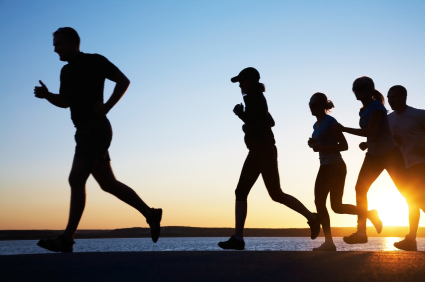 It can sometimes be challenging to stick to a fitness and nutrition program, but it is not impossible. Getting on track NOW helps prevent the ‘anything goes damage’ of the holidays and keeps you in your fitness lifestyle well in advance of the short-lived resolutions of the New Year.
It can sometimes be challenging to stick to a fitness and nutrition program, but it is not impossible. Getting on track NOW helps prevent the ‘anything goes damage’ of the holidays and keeps you in your fitness lifestyle well in advance of the short-lived resolutions of the New Year.
• Start Fresh Daily: Recommit to your exercise and nutrition plan daily by reviewing your goals. Focusing on fitness and nutrition one-day-at-a time works especially well during the holidays when your schedule is invaded with shopping, decorating and parties, and you are exposed to holiday meals above and beyond your usual nutrition plan. Exercise every day, even if it is a short session.
• Eat in Increments: Schedule small meals every three hours in proportion to your activity level. If you are sitting at as desk for the next three hours you will obviously burn fewer calories and require less nutrition to fuel the activity than if you are lifting weights or going for a walk.
• Plan for Parties: On party days, low-calorie meal replacement shakes are a great option allowing you to reserve a few extra calories for the special event. This doesn’t mean when you arrive at the party you can eat with abandon or bust-a-gut on unhealthy foods. However, your overall daily consumption of calories will hopefully be reduced from what you might have consumed with full meals throughout the day.
• Enjoy Foods in Sequence: Eat a protein food first before eating carbohydrates. Protein is a low-glycemic food source that gives carbs a place to land and allows the body to digest food slowly helping to prevent many of the metabolic processes that lead to stored fat. Proteins usually contain some amount of fat, which is also more satisfying so you may be likely to eat less. For example, if the party begins with cocktails, be sure to have a protein-based hors d’oeuvre with the first sip.
• Look Ahead: Setting short-term goals now creates success for long-term goals after the holidays. As soon as the clock strikes the New Year, your target goals transition from daily to weekly. Reward yourself each time you reach a weekly goal. Be specific about your goals and set a date for completion.
• Make Time: Allow ample time in your schedule for your workouts – don’t intentionally get too busy. If you need to, make an appointment with yourself to exercise.
• Plan and Prepare Meals: Make healthy entrees in advance to take with you for lunch and for easy dinners at the end of the day. Freeze the entrees if you need to. Most food items will last for up to 30 days in the freezer. It takes about two-to-four hours to prepare two-to-four weeks of meals.
• Setup Social Support: Find a friend or family member to partner with you in your fitness program. Join a group exercise class and/or participate in a pre-planned meal and support program.
• Track Progress: Don’t weigh on the scale every day, but instead select the same day each week to check your body weight. On the same day each month also measure body composition and take measurements.
• Perform Your Best: Walk, run or bike ride further and faster. Use training progressions to work toward lifting more weight than when you first started exercising.
• Keep a Journal: Track your goals, workouts, meals, measurements and results in a daily journal. It is a great feeling to go back and review the progress you’ve made.



 The “runner’s high,” a “feel better” sensation often experienced by long-distance runners, is generally attributed to high levels of endorphins in the the brain. Researchers have known for some time that exercise increases endorphin production. In addition to improving the efficiency of the heart, lungs and vascular system, aerobic training can actually produce an anti-depressant type of effect including improvements in emotional and intellectual health.
The “runner’s high,” a “feel better” sensation often experienced by long-distance runners, is generally attributed to high levels of endorphins in the the brain. Researchers have known for some time that exercise increases endorphin production. In addition to improving the efficiency of the heart, lungs and vascular system, aerobic training can actually produce an anti-depressant type of effect including improvements in emotional and intellectual health.